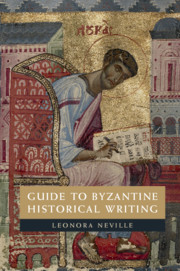Book contents
- Frontmatter
- Dedication
- Contents
- Acknowledgments
- Introduction
- Byzantine Historical Texts
- 1 Theophylakt Simokatta
- 2 Paschal Chronicle
- 3 George Synkellos
- 4 Chronicle of Theophanes
- 5 Patriarch Nikephoros
- 6 Scriptor Incertus de Leo V
- 7 Chronicle of 811
- 8 Megas Chronographos
- 9 George the Monk
- 10 Peter of Alexandria
- 11 Genesios
- 12 Theophanes Continuatus
- 13 Constantinian Excerpts
- 14 John Kaminiates
- 15 Symeon the Logothete
- 16 Leo the Deacon
- 17 Chronicle of Monemvasia
- 18 Chronicon Bruxellense
- 19 Psellos
- 20 John Xiphilinos
- 21 Michael Attaleiates
- 22 John Skylitzes and Scylitzes Continuatus
- 23 George Kedrenos
- 24 Nikephoros Bryennios
- 25 Anna Komnene
- 26 John Kinnamos
- 27 John Zonaras
- 28 Constantine Manasses
- 29 Michael Glykas
- 30 Eustathios of Thessaloniki
- 31 Joel
- 32 Niketas Choniates
- 33 George Akropolites
- 34 Theodore Skoutariotes
- 35 George Pachymeres
- 36 Nikephoros Gregoras
- 37 Ephraim
- 38 Constantine Akropolites the Grand Logothete
- 39 Chronicle of Morea
- 40 Nikephoros Kallistos Xanthopoulos
- 41 John VI Kantakouzenos
- 42 Michael Panaretos
- 43 Chronicle of Ioannina
- 44 Chronicle of Tocco
- 45 John Kananos
- 46 John Anagnostes
- 47 Leontios Machairas
- 48 Sylvester Syropoulos
- 49 Doukas
- 50 George Sphrantzes
- 51 Michael Kritovoulos
- 52 Laonikos Chalkokondyles
- Appendix A Time Periods Covered in the Histories
- Appendix B Timeline of Authors’ Lives
51 - Michael Kritovoulos
from Byzantine Historical Texts
Published online by Cambridge University Press: 14 June 2018
- Frontmatter
- Dedication
- Contents
- Acknowledgments
- Introduction
- Byzantine Historical Texts
- 1 Theophylakt Simokatta
- 2 Paschal Chronicle
- 3 George Synkellos
- 4 Chronicle of Theophanes
- 5 Patriarch Nikephoros
- 6 Scriptor Incertus de Leo V
- 7 Chronicle of 811
- 8 Megas Chronographos
- 9 George the Monk
- 10 Peter of Alexandria
- 11 Genesios
- 12 Theophanes Continuatus
- 13 Constantinian Excerpts
- 14 John Kaminiates
- 15 Symeon the Logothete
- 16 Leo the Deacon
- 17 Chronicle of Monemvasia
- 18 Chronicon Bruxellense
- 19 Psellos
- 20 John Xiphilinos
- 21 Michael Attaleiates
- 22 John Skylitzes and Scylitzes Continuatus
- 23 George Kedrenos
- 24 Nikephoros Bryennios
- 25 Anna Komnene
- 26 John Kinnamos
- 27 John Zonaras
- 28 Constantine Manasses
- 29 Michael Glykas
- 30 Eustathios of Thessaloniki
- 31 Joel
- 32 Niketas Choniates
- 33 George Akropolites
- 34 Theodore Skoutariotes
- 35 George Pachymeres
- 36 Nikephoros Gregoras
- 37 Ephraim
- 38 Constantine Akropolites the Grand Logothete
- 39 Chronicle of Morea
- 40 Nikephoros Kallistos Xanthopoulos
- 41 John VI Kantakouzenos
- 42 Michael Panaretos
- 43 Chronicle of Ioannina
- 44 Chronicle of Tocco
- 45 John Kananos
- 46 John Anagnostes
- 47 Leontios Machairas
- 48 Sylvester Syropoulos
- 49 Doukas
- 50 George Sphrantzes
- 51 Michael Kritovoulos
- 52 Laonikos Chalkokondyles
- Appendix A Time Periods Covered in the Histories
- Appendix B Timeline of Authors’ Lives
Summary
This is a detailed classizing history covering the years 1451– 1467 in five books. The subject of Michael Kritovoulos's work was the final destruction of the Byzantine Empire and the transfer of power to the Ottoman Empire. He paid particular attention to the life and deeds of Sultan Mehmed the Conqueror, to whom he dedicated his history. It opens with a preface in which, along with traditional claims about truthfulness and the importance of preserving the memory of great deeds, he apologizes to his Greek readers for not making Greek suffering the primary subject of his account. He likens himself to ancient historian Flavius Josephus, who sometimes praised the Romans and was not uncritical of his Jewish countrymen.
The first book is one of the most detailed surviving accounts of the fall of Constantinople. The following four books concern Mehmed's military campaigns, his conquest of the remaining portions of the Byzantine Empire, and his efforts to rebuild Constantinople, which had been largely depopulated, into a worthy capital for his empire. Kritovoulos, for instance, described how the Sultan forcibly resettled thousands of Christians, Jews, and Muslims to the city, launched ambitious building projects, appointed a Greek Patriarch in 1454, and attempted to revive the city's economic life. Throughout the History, Kritovoulos intersperses autobiographical details regarding his own role in the transition to Ottoman rule.
Kritovoulos rarely names his sources, but his work appears to have been based on spoken conversations in Turkish and Greek, as well as his own personal experience. Some scholars have criticized him as little more than a propagandist for the Sultan, whom he frequently praised. Deither Reinsch has argued that Kritovoulos did have sympathies for the Ottomans but was still a Byzantine patriot, a view that has been seconded by Hunter Koski. In general, Kritovoulos's accounts accord well with other sources from the time and remain among the most comprehensive for a period from which few historical narratives survive.
Kritovoulos of Imbros was the classicizing pen name of Michael Kritopoulos, a Byzantine scholar from the Aegean island of Imbros. Probably born between 1400 and 1410, Kritovoulos lived in Imbros and Constantinople during his childhood.
Information
- Type
- Chapter
- Information
- Guide to Byzantine Historical Writing , pp. 308 - 311Publisher: Cambridge University PressPrint publication year: 2018
